最新8B-Unit3知识点语法汇总
牛津译林版八年级下册8B-Unit3-重点知识总结

牛津译林版八年级下册8B-Unit3-重点知识总结本文档总结了牛津译林版八年级下册8B-Unit3的重点知识。
以下是该单元的内容摘要:1. 主题:本单元的主题是“记者报道”。
2. 词汇与短语:- 单词:reporter(记者),interview(采访),conference(会议),headline(标题),headline news(头条新闻)- 短语:be interested in(对...感兴趣),the same as(与...相同),get along with(和...相处),be proud of(为...自豪)3. 语法:- 一般现在时:用来描述经常发生的事情,如:She often writes reports.- 现在进行时:用来描述正在进行的动作,如:He is interviewing a famous actor.- 一般过去时:用来描述过去发生的事情,如:The reporter interviewed the mayor yesterday.4. 阅读理解:本单元共有两篇阅读理解,题目分别是“Interview with a Celebrity”和“A Day in the Life of a News Reporter”。
这两篇文章讲述了记者采访名人和新闻记者的工作日常。
5. 语言点:- 名词性从句:如:I know what you said.- 形容词性从句:如:The news is interesting because it is about a famous actor.- 定语从句:如:The boy who is talking to the reporter is my friend.以上是牛津译林版八年级下册8B-Unit3的重点知识总结,希望对你有帮助。
牛津译林版八年级下册8B-Unit3-知识点整理

8B Unit 31. online 1)adj. 联网的,在线的2)adv. 在线chat online3. agree with sb. 同意某人的观点agree to do sth. 同意做某事I can’t agree (with you) more.我非常同意(你的观点)。
4.programme [c]n. 节目,计划,方案5.control:1)n.a remote control 遥控器2)v. control control oneself/ the country6.key ②钥匙the key to the door ③秘诀the key to success1)mouse [c]n.鼠标复数:mouses 或miceThe ___________ (mouse) here match the keyboard well.5.1) use sth. for sth./ doing sth. use sth. to do sth.2) search for sth. +介词+sp.= search sp. for sth.send sb. sth.= send sth. to sb. send---_________(过去式) receive sth. from sb. How soon 用于将来时对“in+段时间”提问--- __________________ will he come back home? --- In ten minutes.How long 对段时间、长度提问For two hours. / Two metres long.How far 对距离提问Two kilom etres away./ Two hours’ ride6.notice 1)[c]n. 布告,通知2)v. ①notice sth. ②notice sb. do/doing sth. ③notice+从句I notice her ________ (chat) with her classmates when I came in the classroom.12. icon [c]n. an iconclick 1) vi. click on the icon 2) vt. click the mouse13. at the top/bottom of ... 在...顶部/底部at the foot of the mountain在山脚at the northern end of...在...北端in the northern part of ...在...北部on the north coast of.. 在...北海岸线上14.Victor Hugo is _____________ European. (a/an/the)15.1)主语为代词时,为半倒装e.g. Here it is./ Here we are in “the Big Apple”.2)主语为名词时,为全倒装E.g. Further on is Times Square./ In the centre of the island is Central Park.3)倒装句谓语动词和主语保持一致,没有进行时态。
8BUnit3学习知识点.docx
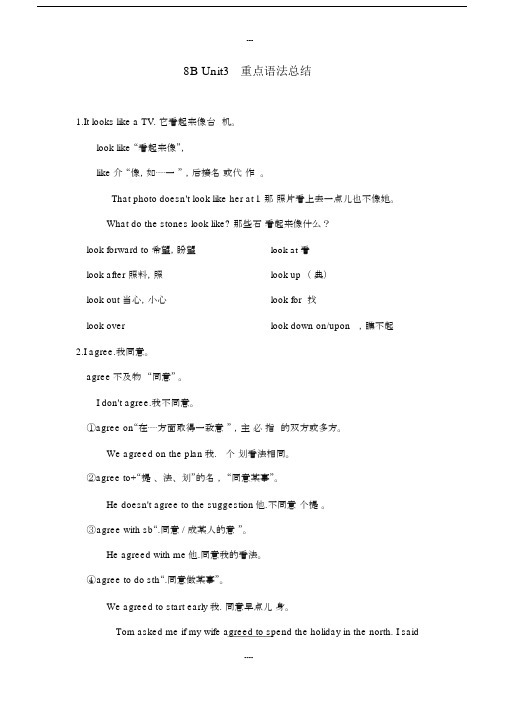
---8B Unit3重点语法总结1.It looks like a TV. 它看起来像台机。
look like “看起来像”,like 介“像,如⋯⋯一” ,后接名或代作。
That photo doesn't look like her at l. 那照片看上去一点儿也不像她。
What do the stones look like? 那些石看起来像什么?look forward to 希望,盼望look at 看look after 照料,照look up (典)look out 当心,小心look for 找look over look down on/upon ,瞧不起2.I agree.我同意。
agree不及物“同意”。
I don't agree.我不同意。
①agree on“在⋯⋯方面取得一致意”,主必指的双方或多方。
We agreed on the plan我.个划看法相同。
②agree to+“提、法、划”的名,“同意某事”。
He doesn't agree to the suggestion他.不同意个提。
③a gree with sb“.同意 /成某人的意”。
He agreed with me他.同意我的看法。
④a gree to do sth“.同意做某事”。
We agreed to start early我.同意早点儿身。
Tom asked me if my wife agreed to spend the holiday in the north. I saidthat she agreed to my idea,so we agreed on a date for it,and my wifeagreed with what Id id.汤姆问我我妻子是否同意去北方度假。
我说她同意我的想法。
因此我们就定了个日子。
我妻子对我的做法表示赞同。
3.Look,this programme began an hour again.看,这个节目一小时前开始的。
牛津译林版八年级下册8B-Unit3-知识点归纳

牛津译林版八年级下册8B-Unit3-知识点
归纳
1. 课文概述
本单元的主题是“多元文化”,通过阅读介绍了澳大利亚的土著文化以及其他多元文化的故事,增加了我们的文化视野。
2. 单词和短语
本单元中涉及的一些重要单词和短语有:
- native: 本地的
- tribe: 部落
- ancestor: 祖先
- artwork: 艺术作品
- traditional: 传统的
- identity: 身份
3. 语法知识点
本单元涵盖了以下语法知识点:
- The Third Conditional (第三条件句): 用于表示在过去某个时间发生的假设情况,其结果与现在相反。
例如:If I had studied harder, I would have passed the exam.(如果我更加努力研究,我就能通过考试。
)
4. 阅读和写作技巧
本单元的阅读和写作技巧主要包括:
- 掌握阅读理解技巧,如扫读和细读;
- 研究如何使用上下文推断单词的含义;
- 训练自己写作技巧,如写作描述性短文和议论文。
5. 文化背景
本单元通过介绍澳大利亚土著文化,让学生了解到不同的文化背景对人们的生活和价值观有何影响。
6. 研究目标
本单元的研究目标包括:
- 熟练掌握本单元的重要词汇和短语;
- 理解并正确运用第三条件句;
- 提高阅读和写作技巧;
- 增加对不同文化的了解和尊重。
以上是牛津译林版八年级下册8B-Unit3-知识点的归纳,希望对你有所帮助。
8BUnit3词组、句型及语法复习.doc
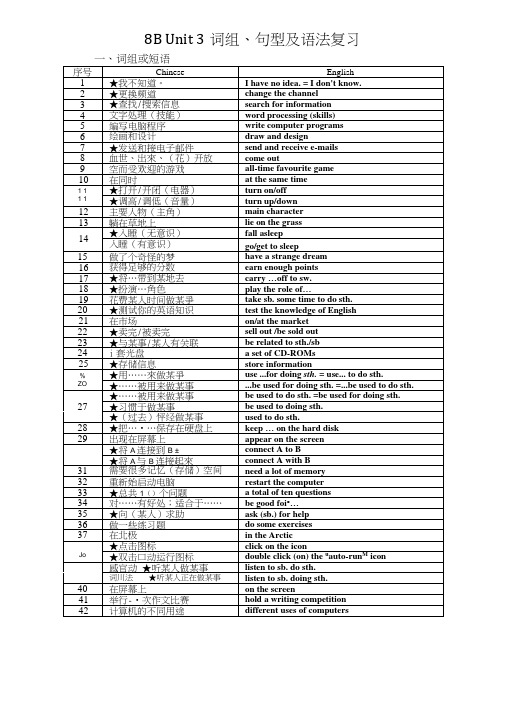
8B Unit 3词组、句型及语法复习一、词组或短语二、重点句子及句型:l.The TV is turned on now.2・ I usually use it to search for information. (=1 usually use it for searching for information.)3. A new educational CD-ROM (called "Around the World in Eight Hours v)has just come out.4.It was designed by Nancy Jackson.5.He was lying on the grass and looking at the beautiful sk、when he fell asleep and had a strange dream.6.When you have earned enough points , a cloud will come down and carry you off to a place (you havenever visited before.)7.When you play this game, you will] play the role o# Itchy Feci.8.Each level will take you about half an hour to finish.= It will take you about half an hour to finish each level.9.This CD-ROM helps you learn English by testing your knowledge of English urammar and vocabulary ・10.Did you connect the keyboard to the computer properly?1 l.The places (you have visited) are marked in bright purple.(用亮紫色被标上记号)12.That is for you to find out.(那就留给你去查明吧。
8BUnit3知识点讲解
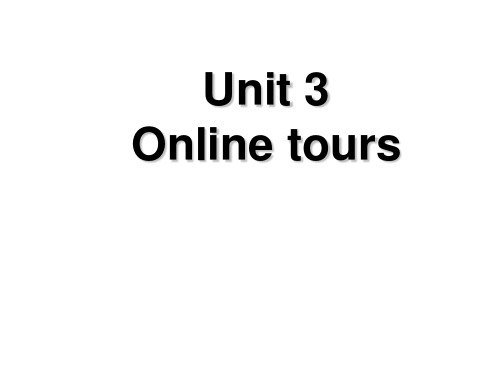
Comic strip Welcome to the unit
Words and expressions in Unit 3
It looks like a TV.
look like 看起来像 The sun looks like an orange globe. 太阳看起来就像个橘黄色的球体。
Look for the icon _a_t_t_h_e_b__o_tt_o_m__o_f_ the listing.
Click on it, pick another and then start your new tour. 点击它,挑选另一个城市,然后开始你的新旅程。
pick v. 挑选;采摘 It took her two hours to pick a dress that suited her. 她花了两个小时才挑选一条适合她的连衣裙。 Can you pick some flowers for the dinner table? 你能采些花放在餐桌上么? pick up拿起;捡起;(开车)接人 He picked up his knife and fork. 他拿起了刀叉。 pick out 挑选 Who will you pick out to represent the whole team? 你 讲挑选谁代表全队?
— __C_____ does your son use the computer ____?
— Drawing and designing.
A. How; on
B. How; /
C. What; for
D. What; /
I usually use it to search for information. use sth. to do sth.用某物做某事 相当于use sth. for doing sth. 他经常用电脑收发电子邮件。 He often uses the computer to send and receive emails.
8B Unit3 Online tours知识点汇总

8B Unit3 Online tours单元知识点汇总Comic strip&Welcome to the unit1.It looks like a TV.它看起来像台电视机。
look like意为“看起来像”,like此处用作介词,意为“像,如……一样”,后接名词或代词作宾语。
look forward to期待,盼望look after照料,照顾look out当心,小心look over检查look at看look up查阅(词典)look for寻找look down on/upon轻视,瞧不起2.I agree.我同意。
agree此处用作不及物动词,意为“同意”。
I don't agree.我不同意。
①agree on意为“在……方面取得一致意见”,主语必须指协调的双方或多方。
①agree to+表示“提议、办法、计划”等的名词,意为“同意某事”。
①agree with sb.意为“同意/赞成某人的意见”。
①agree to do sth.意为“同意做某事”。
①agree +宾语从句,意为“同意……”。
3.Look,this programme began an hour ago.看,这个节目一小时前开始的。
begin(began,begun)此处用作不及物动词,意为“开始”。
School begins in September.学校9月份开学。
begin也可用作及物动词,begin doing sth.和begin to do sth.都表示“开始做某事”。
4.It's boring.它很枯燥。
boring形容词,意为“没趣的;令人厌烦的”,常用来说明事物具有的特征,故常修饰物;bored也是形容词,意为“感到无聊的”,常用来说明人的感受,故常修饰人。
用法类似的词还有excited,exciting;surprised,surprising;interested,interesting等。
8B Unit3知识点

8B Unit3 重点语法总结1、It looks like a TV、它瞧起来像台电视机。
look like“瞧起来像”,like介词“像,如……一样”,后接名词或代词作实语。
That photo doesn't look like her at l、那张照片瞧上去一点儿也不像她。
What do the stones look like? 那些石头瞧起来像什么?look forward to 希望,盼望look after照料,照顾look out当心,小心look over检查look at瞧look up查(词典)look for寻找look down on/upon轻视,瞧不起2、I agree、我同意。
agree不及物动词“同意”。
I don't agree、我不同意。
①agree on“在……方面取得一致意见”,主语必须指协调得双方或多方。
We agreed on the plan、我们对这个计划瞧法相同。
②agree to+“提议、办法、计划”得名词,“同意某事”。
He doesn't agree to the suggestion、她不同意这个提议。
③agree with sb、“同意/赞成某人得意见”。
He agreed with me、她同意我得瞧法。
④agree to do sth、“同意做某事”。
We agreed to start early、我们同意早点儿动身。
Tom asked me if my wife agreed to spend the holiday in the north、I said that she agreed to my idea,so we agreed on a date for it,andmy wife agreed with what Id id、汤姆问我我妻子就是否同意去北方度假。
我说她同意我得想法。
因此我们就定了个日子。
最新8b-unit3知识点梳理与内容解析

Unit 3 Online ToursComic strip &Welcome to the unit1.Online tours网上旅行(1)Online adj.在线的,联网的,作定语或表语Online friend=e-friend网友online working 在线工作(2)online adv.在线地,在网上Chat online 上网聊天Buy things online在线购物例句:我一般每星期花费大概10个小时的时间上网玩游戏。
2.It looks like a TVLook like 看起来像,看上去像Look 是系动词,like 是介词“像”Look like 后可加名词或者动名词.(1)It looks like snowing. 看起来好像在下雪含有like的短语Be like 事实上像,说明任务的性格特征Sound like 听起来像Seem like 似乎像Feel like 想要,喜欢例题:(1)-What does Michael ?-He has big eyes adn a wide mouth.(2)-What you father ?-Oh, he’s very friendly.3.-What do you usually use your computer for?-I usually use it to search for information.(1)what...for表示“为什么”=whyWhat do you ususally use your computer for?=why do you usually use your computer?例句:你为什么要出国?=(2)search”搜索,寻找”后面通常加的是被搜查的人或者场所,而不是所要寻找的对象;如果宾语是要寻找的对象,需要用search for.常见短语:Search sb. 给某热搜身Search sth./sp.搜查某地或某物Search for sth.寻找某物Search sp. For sth.搜查某地来寻找某物例句:史密斯先生把屋子里的每个房间都找了一遍。
牛津初中英语8B?Unit3单元知识点复习

牛津初中英语8B Unit3单元知识点复习牛津初中英语8b unit3单元知识点复习1.被动语态1一般现在时的被动结构:am /is /are done.paper ____________(make) in this factory.2.一般过去时的被动结构:was /were done.this cup ___________( use)for drinking nine years ago3.含情态动词的被动结构:can /may / must /should be done.the playground can /may /must ___________(clean) after school.4.一般将来时的被动结构:be going to / will be done。
a new bridge ____________( build) over the river here next year.5.现在进行时的被动结构:be being done.a teaching building ______________(build) in our school now.6.现在完成时的被动结构have/has been done.thousands of trees ____________ _(plant) on the hills since last year.有关被动语态的几个问题1.双宾语的被动语态show ,pass, give sb.sth.=show, pass .give sth. to sb.buy, get, sing sb. sth.=buy, get, sing sth. for sb.my uncle gave me a new dictionary yesterday.___________________________ _/_________________________ __.2.复合宾语的被动语态 make/see/hear/watch sb. do sth.=sb. be made/seen/heard/watched to do sth.the boss made her work for sixteen hours a day.____________________________________________.3.短语动词的被动语态we should take care of the old people very well.______________________________________________.4.特殊疑问句的被动语态who broke my cup?_______________________________________________.exercises1.the work is easy and interesting.i like it.it ____ (finish)in half an hour.2.---what ____ (happen)to li tao yesterday morning?---a car ____ (hit) him when he was riding to school,and he ____ (take)to hospital at once.”3.---can the tree ____ (plant)here? ---yes.let's ____ (dig)a hole first.---shall i ____ (carry)some water here?---yes, please.young trees should ____ (water) very well.4.---the dress _____(look)very beautiful.what____ it ___(make)of?.---it ____ (make)of cotton.2.asleep, sleeping , sleepyasleep adj 用作表语, 后置定语. be(fast) asleep/ fall asleep•i found a boy _____________________(在空房子里睡着了)sleeping a sleeping boy a sleeping car•don’t make any noise. he______________( sleep).sleepy用作表语,是“瞌睡的, 困乏的”意思。
8BUnit 3知识点总结

8B Unit 3 知识总结一、重点短语1. look like …看上去像…2. cha t with friends 和朋友聊天3. search for information 查找信息4. send and receive emails 发送和接收邮件5. watch videos 观看录像6. use … to do sth 用…去做….7. welcome to…欢迎来到…. use… for (doing)sth.8. at the top of…. 在…的顶端9. click on…. 点击….10.in only eight hours 仅仅在八小时内11. at the southern end of….在….的最南端12.two thousand students 两千学生13. in the center of the island 在岛中心thousands of students 数千学生14.hear of …. 听说…15.be famous for…因…而出名hear from…收到…的来信be famous as…作为…而出名16. come(be) from 来自…17. at the bottom of…在…的底部18. the early twentieth century 二十世纪早期19. dream of /about(doing) sth 梦想…. 20. so much for……. 到此为止21. be made up of…. 由…组成22. My pleasure .= It’s a pleasure. 不用谢。
23. the capital city 首都城市With pleasure. 乐意效劳。
24. have a long history 有悠久的历史25. once its rulers 曾经它的统治者26. be the home of…. …的家27. learn a lot about…了解有关…的许多28. prepare for…为….作准备29. many places of natural beauty30. mind doing sth. 介意做某事31.on the north-east coast of Australia32. the opposite of.. 与…相反33. on the website34. take an online tour 35. a wonderful building called…36. look like a ship with many sails二、重点句子1.---Have you used this before ? --- No, never. (No, I haven’t.)2.--- Where is the book ? ----Here it is.3.It’s exciting to see the huge glass ball falling through the darkness.4.It’s a good place to relax after a hard day’s work.5.It has been famous for its theatres since the early twentieth century.6.So much for New York. 纽约就这么多了。
8bunit3知识点梳理与内容解析

Unit 3 Online Tours Comic strip &Welcome to the unit1.Online tours网上旅行(1)Online adj.在线的,联网的,作定语或表语Online friend=e-friend网友 online working 在线工作(2)online adv.在线地,在网上Chat online 上网聊天Buy things online在线购物例句:我一般每星期花费大概10个小时的时间上网玩游戏。
2.It looks like a TVLook like 看起来像,看上去像Look 是系动词,like 是介词“像”Look like 后可加名词或者动名词.(1)It looks like snowing. 看起来好像在下雪含有like的短语Be like 事实上像,说明任务的性格特征Sound like 听起来像Seem like 似乎像Feel like 想要,喜欢例题:(1)-What does Michael-He has big eyes adn a wide mouth.(2)-What you father-Oh, he’s very friendly.3.-What do you usually use your computer for-I usually use it to search for information.(1)what...for表示“为什么”=whyWhat do you ususally use your computer for=why do you usually use your computer例句:你为什么要出国=(2)search”搜索,寻找”后面通常加的是被搜查的人或者场所,而不是所要寻找的对象;如果宾语是要寻找的对象,需要用search for.常见短语:Search sb. 给某热搜身Search sth./sp.搜查某地或某物Search for sth.寻找某物Search sp. For sth.搜查某地来寻找某物例句:史密斯先生把屋子里的每个房间都找了一遍。
(word完整版)牛津8BUnit3知识点归纳、难点解析、语法复习,推荐文档

8B Unit 3 Online travel【短语学习重点】P.40-451 I have no idea. 我不知道2 look like a television 看起来像电视机3 agree with sb /agree to do sth 赞同某人4 The TV is turned on. 电视打开了5 change the channel 换频道6 search for the information 搜索信息7 send and receive e-mails 收发电子邮件8 write computer programs 编写电脑程序9 What do you usually use your computer for? 你通常用电脑做什么?10 use sth for doing sth =use sth to do sth 用某物做某事11. A new computer CD-ROM has just come out. 新的教学光盘刚刚出版12 sound interesting 听起来有趣13 at the same time 同时14 be designed by sb 由某人设计15 …designer of………的设计者14 the main character 主要人物15 a thirteen-year-old boy 一个13岁的男孩16 fall asleep 入睡17 have a strange dream 做了一个奇怪的梦18 a golden cloud 一朵金色的云19 with questions on them 有着问题在云上20 every time 每次21 have enough points 有足够的点数22 carry you off to a place 载你离开到一个地方23 play a role of 扮演…..的角色24.have eight levels 有八个等级25 Each level will take you about an hour to finish. 每级要花你半个小时完成26 by doing sth 通过做某事by testing your knowledge of English grammar and vocabulary通过测试你的英语语法和词汇的知识27 on your screen 在你的屏幕上28 learn about 获悉,了解29 pass a level 通过一个等级30 a map of the world 世界地图31 be marked in bright purple 用亮紫色标注32. on the market 出售,上市33 be sold out 被卖光34 sta rt with…以……开始35a map of China 一副中国地图P.46-5736 click on it for more details 点击它获取更多的细节37 many kinds of 许多种类38 think about 考虑39 check the settings 检查设置40 connect the keyboard to the computer properly 将键盘与电脑正确地连接起来41 when necessary 有必要的时候42. daily English 日常英语43. start short online tours of Australia and New Zealand启动澳大利亚和新西兰的短途在线旅行44. listen to people talking 听人交谈45 learn a lot form…从……中学到很多46.Many topics are covered in the course. 过程中涉及到许多话题47. order a package online 在线订购一套48. mind doing sth 介意做某事49 A worksheet has just appeared on the screen. 一个工作记录表刚刚出现在屏幕上。
8B Unit3 重点短语及句型归纳
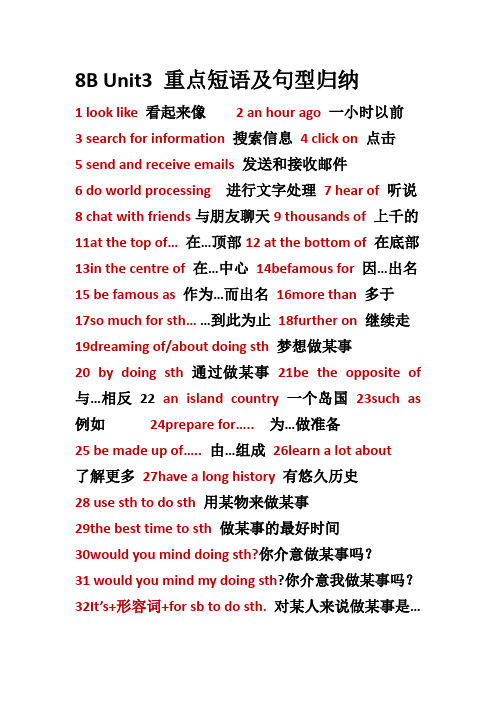
8B Unit3 重点短语及句型归纳1 look like看起来像2 an hour ago一小时以前3 search for information 搜索信息4 click on点击5 send and receive emails发送和接收邮件6 do world processing 进行文字处理7 hear of 听说8 chat with friends与朋友聊天9 thousands of 上千的11at the top of…在…顶部12 at the bottom of在底部13in the centre of在…中心14befamous for因…出名15 be famous as 作为…而出名16more than多于17so much for sth……到此为止18further on继续走19dreaming of/about doing sth 梦想做某事20 by doing sth 通过做某事21be the opposite of 与…相反22 an island country 一个岛国23such as 例如24prepare for….. 为…做准备25 be made up of…..由…组成26learn a lot about了解更多27have a long history 有悠久历史28 use sth to do sth用某物来做某事29the best time to sth 做某事的最好时间30would you mind doing sth?你介意做某事吗?31 would you mind my doing sth?你介意我做某事吗?32It’s+形容词+for sb to do sth.对某人来说做某事是…。
牛津译林版八年级下册8B-Unit3-重要知识整理
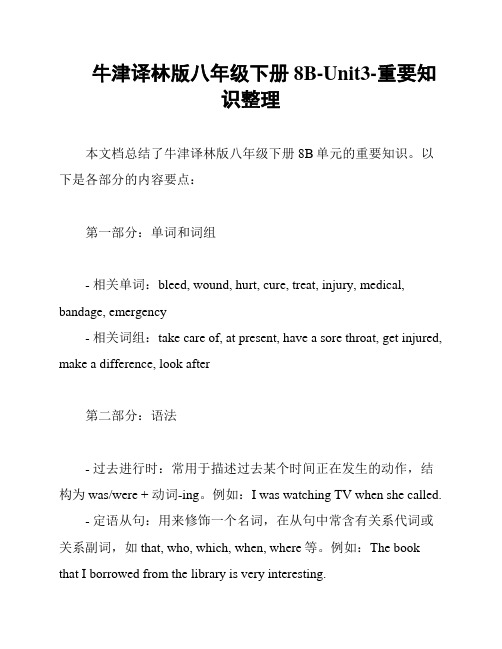
牛津译林版八年级下册8B-Unit3-重要知
识整理
本文档总结了牛津译林版八年级下册8B单元的重要知识。
以下是各部分的内容要点:
第一部分:单词和词组
- 相关单词:bleed, wound, hurt, cure, treat, injury, medical, bandage, emergency
- 相关词组:take care of, at present, have a sore throat, get injured, make a difference, look after
第二部分:语法
- 过去进行时:常用于描述过去某个时间正在发生的动作,结构为was/were + 动词-ing。
例如:I was watching TV when she called.
- 定语从句:用来修饰一个名词,在从句中常含有关系代词或关系副词,如that, who, which, when, where等。
例如:The book that I borrowed from the library is very interesting.
第三部分:阅读理解
本单元的阅读理解主要涉及健康和医疗方面的话题,如急救知识、保持健康的方法等。
文章包括多个题目和相关问题,需要通过阅读文章来回答问题。
第四部分:写作
本单元的写作部分要求学生描述自己或他人的一次意外事故,并分享如何应对和处理这种情况。
学生应使用过去进行时和定语从句等语法知识来描述事件,并提出建议和解决办法。
以上是牛津译林版八年级下册8B单元重要知识的整理。
希望对您有所帮助!。
(完整版)8bunit3知识点梳理与内容解析
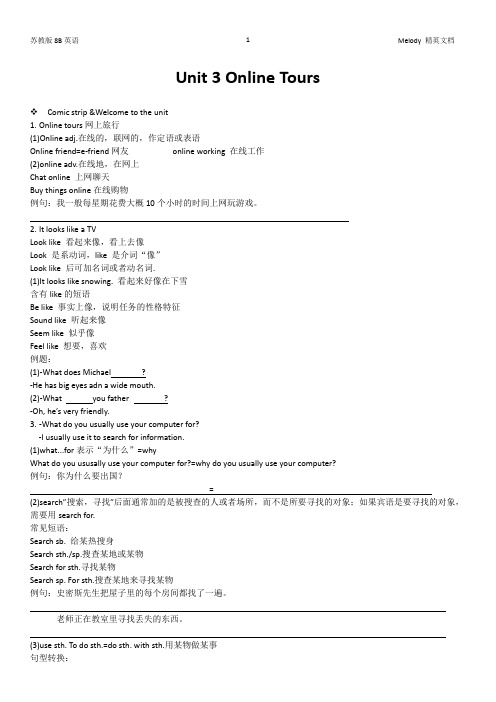
Unit 3 Online Tours❖Comic strip &Welcome to the unit1.Online tours网上旅行(1)Online adj.在线的,联网的,作定语或表语Online friend=e-friend网友online working 在线工作(2)online adv.在线地,在网上Chat online 上网聊天Buy things online在线购物例句:我一般每星期花费大概10个小时的时间上网玩游戏。
2.It looks like a TVLook like 看起来像,看上去像Look 是系动词,like 是介词“像”Look like 后可加名词或者动名词.(1)It looks like snowing. 看起来好像在下雪含有like的短语Be like 事实上像,说明任务的性格特征Sound like 听起来像Seem like 似乎像Feel like 想要,喜欢例题:(1)-What does Michael ?-He has big eyes adn a wide mouth.(2)-What you father ?-Oh, he’s very friendly.3.-What do you usually use your computer for?-I usually use it to search for information.(1)what...for表示“为什么”=whyWhat do you ususally use your computer for?=why do you usually use your computer?例句:你为什么要出国?=(2)search”搜索,寻找”后面通常加的是被搜查的人或者场所,而不是所要寻找的对象;如果宾语是要寻找的对象,需要用search for.常见短语:Search sb. 给某热搜身Search sth./sp.搜查某地或某物Search for sth.寻找某物Search sp. For sth.搜查某地来寻找某物例句:史密斯先生把屋子里的每个房间都找了一遍。
牛津译林版八年级下册8BUnit3知识梳理

牛津译林版八年级下册8BUnit3知识梳理知识点一 Comic-Reading 部分单词短语讲解【知识梳理】1. Have you used this before, Eddie? (P34) 艾迪,你之前使用过这个吗?What do you usually use your computer for? (P35) 你通常用电脑做什么?I usually use it to search for information. (P35) 我通常用它寻找信息。
How often do you use your computer for this? (P35) 你用电脑做这个多久一次?use用法use /ju:z/ v. 使用 adj. useless(无用的); useful(有用的)常见的词组有:① use sth. to do sth 使用某物做某事e.g.: People use knives to cut things.② use sth for sth. 为了…使用…e.g.: He uses the Pad for fun.③ used to do sth. (用于过去持续或经常发生的事)曾经e.g.: There used to be a factory here.He used to go home before 8 o’clock.④ be/ get used to sth/ doing sth. 习惯于某事/做某事e.g.: I have been in Nanjing for 8 years, and I am used to the life and climate here.She is now getting used to going home for dinner.⑤be used to do sth 被用来做……e.g.: Computers can be used to do a lot of work.2.It looks like a TV. (P34)It looks like a bird.— What does your brother look like?你哥哥什么样子?— He is tall and thin.同义句转换:What does sb look like? (外貌)=How does sb look? (外貌)=What is sb like? (品质或外貌)What does sb like?(喜好)3. agree vi. 同意, 赞成(P34)agree with sb. 同意某人的意见e.g. I don’t agree with you.agree to do sth.同意做某事agreement n.同意 reach the agreement 达成共识4. What do you usually use the computer for? (P35)该句中的What ... for? 是个固定句型, 意为“做……是为了什么?”, 其中for是介词, 表目的。
- 1、下载文档前请自行甄别文档内容的完整性,平台不提供额外的编辑、内容补充、找答案等附加服务。
- 2、"仅部分预览"的文档,不可在线预览部分如存在完整性等问题,可反馈申请退款(可完整预览的文档不适用该条件!)。
- 3、如文档侵犯您的权益,请联系客服反馈,我们会尽快为您处理(人工客服工作时间:9:00-18:30)。
(牛津初中英语总复习) 8B Unit 3一.【精选词汇】㈠重点短语1. I have no idea.=I’ve no idea.=I don’t know.我不知道。
(p40)2. turn on the TV →turn on/off打开/关闭…,turn up/down调大/调低;都是“动词+副词”。
3. change the channel换台→on Channel…在…台,e.g. on CCTV-5→拓展:the English Channel英吉利海峡4. different uses of computers计算机的不同用途:draw and design, play computer games, search for information, send and receive e-mails收发电子邮件, do word processing进行文字处理, write computer programs编写计算机程序(p41)5. travel around the world in eight hours八小时环游地球,educational CD-ROM教育软件(p42)6. come out (书等)出版,发行,发表,不能用于被动语态,可以转化为be published。
〈知识链接〉When will her new novel come out?=When will her new novel be published?〈用法拓展〉⑴(太阳、月亮或星星)出现;露出, e.g. The rained stopped and the sun came out.⑵(花朵)开放;(草)出芽,e.g. In March flowers and grass come out.7. learn English and geography at the same time同时学英语和地理→at the same time同时〈知识链接〉learn and play at the same time边学边玩=play the lead role of…8. the main character主角→play the main character of…扮演…,the best actor最佳男主角,the best actress最佳女主角〈知识链接〉play the role…9. have/get itchy feet渴望旅行, e.g. She has gone to Australia-she has always had itchy feet.10. help you learn English by testing your knowledge of English grammar and vocabulary (p43)〈知识链接〉⑴by介词,通过某种方法、手段,后接名词或动词-ing。
①He made a living by selling flowers. ②You.can know more about the news by reading today’s newspaper⑵have a knowledge of有某方面的知识, e.g. ①He has a wide knowledge of painting.他在绘画方面知识渊博。
②Knowledge is power.知识就是力量。
11. one of the best on the market市面上最畅销的一种12. choose one icon in the menu在菜单里选择一个图标,click on it for more details点击它以了解详情→click on…点击…,left double-click on…左键双击…13. open my new e-dictionary on my computer打开我电脑上的新电子词典(p48)〈知识链接〉“打开”电脑的软件用open不用turn on。
〈用法拓展〉⑴英汉词典an English-Chinese dictionary,汉英词典 a Chinese-English dictionary⑵查字典:look up a word in a dictionary或look a word up in a dictionary14. restart the computer重新启动电脑→ start vt.启动;开始→ restart重新启动〈知识链接〉re+部分动词→再…,e.g. rebuild重建,reuse循环使用,retell复述〈用法拓展〉set off=start off出发;动身,set about doing sth开始做某事,着手做某事15. check the settings检查设置,double-click on the “auto-run” icon双击“自动运行”图标,double-click on the icon=double-click on the icon for…双击…图标,put in the CD-ROM插入光盘-click on the…iconfor “Tour”→double16. connect the keyboard to the computer properly正确地连接键盘和电脑与…连接⑵proper adj.正确的→properly〈知识链接〉⑴connect A to B连接A和B →be connected to…17. grow an inch长一英寸,grow to six feet long长到六英尺长→ A foot is equal to 12 inches.18. daily English=everyday English日常英语→daily newspaper日报,Xinhua Daily新华日报19. go on short tours of Australia and New Zealand去澳大利亚和新西兰短期旅行(p52)20. be hidden in somewhere in the Arctic被藏在北极的某个地方→be hidden+地点,被藏在…21. the treasure box百宝箱→treasure hunt寻宝(p55)㈡词汇解析1. online adj.联网的;在线的 e.g. chat online网上聊天,order a package online网上订购一套⑵达到,e.g. ①reach 18 years old年满18岁②The child isn’t tall2. reach ⑴vt.到达=get to…=arrive at/in… enough to reach the snacks on the table. ⑶reach out a hand伸出一只手3. ⑴correctly adv.正确地→correct ①adj.正确的→incorrect→incorrectly ②vt.改正;修正, e.g. correct a mistake 改正错误⑵correct正确的→wrong错误的,in the correct order按正确顺序4. educate v.教育→education n.教育→educational adj.教育的,e.g. ①educate oneself自修;培养②be educated at school在学校里受教育③have a good education受到良好教育因…而出名,be 5. knowledge n.知识→know vt.知道→be known to sb为某人所知,be well known/famous for…known as…作为…而出名,e.g. Samuel Clemens, who was known as Mark Twain, was a famous American writer.塞缪斯·克莱门斯,以马克·吐温知名,是美国名作家。
6. point ⑴n.分数 e.g. get 100 points得100分⑵n.小数点 e.g. 1.732读作one point seven three two指向⑶v.指 e.g. point out指出,point at/to…7. regards(用于信函的结尾或转达问候)致意;问候→regard sb as…把某人视为…8. company简写作Co.,e.g.有限公司company limited=Co., Ltd。
producer制作人;制造商。
9. 使用计算机Office word常用短语:create a file创建文档,keep/save the file for future use保存该文档以备用。
“收发电子邮件”send and receive e-mails需要“电子信箱”e-mail address。
10. control ⑴n.(键盘上的)控制键⑵vt.控制 e.g. ①The traffic lights are controlled by a central computer.交通信号灯由中心计算机控制。
②This knob controls the volume.此旋钮调节音量。
二.【重点句型】1. —What do you use your computer for? —I usually use it to search for information. (p41)〈知识链接〉What…for?=Why…?为什么…? e.g. What did you do that for?=Why did you do that?陈述句+附加疑问?”构成反意疑问句。
(p42)2. It sounds interesting, doesn’t it? →“⑴附加疑问即“助动词或助动词的否定式缩写+主语或there”;附加疑问部分的助动词必须与陈述句保持一致,主语必须是人称代词或there,并与陈述句主语的单复数保持一致。
⑵前肯定后否定;前否定后肯定。
尤其要注意“前否定后肯定”答语的英汉差异。
⑶反意疑问句的答语为“Yes, 主语+助动词.”或“No, 主语+助动词的否定式”。
Yes, he did. Though he wasn’t feeling well.e.g. —Simon didn’t take part in the football match, did he? ——西蒙没有参加足球赛,是吗?—不,他参加了。
